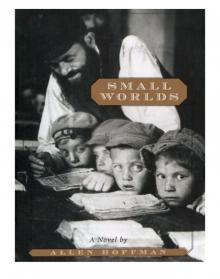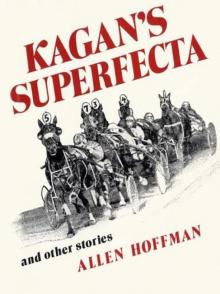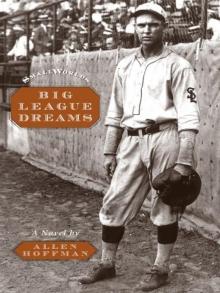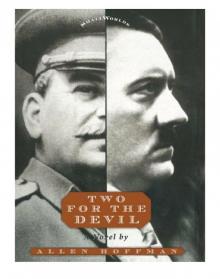- Home
- Allen Hoffman
Small Worlds
Small Worlds Read online
Table of Contents
Title Page
Dedication
RECOLLECTIONS
CHAPTER ONE
CHAPTER TWO
CHAPTER THREE
CHAPTER FOUR
CHAPTER FIVE
CHAPTER SIX
CHAPTER SEVEN
CHAPTER EIGHT
CHAPTER NINE
CHAPTER TEN
CHAPTER ELEVEN
CHAPTER TWELVE
CHAPTER THIRTEEN
CHAPTER FOURTEEN
CHAPTER FIFTEEN
CHAPTER SIXTEEN
CHAPTER SEVENTEEN
CHAPTER EIGHTEEN
CHAPTER NINETEEN
CHAPTER TWENTY
CHAPTER TWENTY-ONE
CHAPTER TWENTY-TWO
CHAPTER TWENTY-THREE
CHAPTER TWENTY-FOUR
CHAPTER TWENTY-FIVE
CHAPTER TWENTY-SIX
CHAPTER TWENTY-SEVEN
CHAPTER TWENTY-EIGHT
CHAPTER TWENTY-NINE
CHAPTER THIRTY
CHAPTER THIRTY-ONE
CHAPTER THIRTY-TWO
THE BRIDGE
ABOUT THE AUTHOR
Copyright Page
For Stefani
Even man’s eye is a small world: the orb is the globe,
the white is the encircling ocean, the iris is the dry land,
the pupil is Jerusalem, and the image reflected in the
pupil is the holy Temple, may it soon be rebuilt in our
days and in the days of all Israel. Amen.
Tractate Derech Eretz Zuta
We hope you enjoy this book from Abbeville Press. To write to the author or see our other titles, click here. (This link will open your device’s web browser.)
RECOLLECTIONS
THE RUSSIANS CALLED IT KRIMSK; THE POLES CALLED it Kromsk, but it was mainly the Jews who lived there. They called it whatever their hosts preferred. Krimsk—so it was named in 1903—had hills and valleys, forests not far from town, pastures and fields close by. The railroad was a day’s wagon ride away in the more fortunate town of Sufnitz, whose railroad spikes firmly held the rails onto the heavy wooden ties and also kept its name firmly rooted. Sufnitz managed to avoid changing its name every time the border shifted.
Krimsk had no railroad with its fixed spikes mating metal to the wood rooted in earth, but it did have a flowing river whose name remained constant—the River Nedd. In his famous and disastrous Russian campaign, Napoleon had crossed the River Nedd at Krimsk. Unfortunately even such a remarkable and lustrous fact was slightly tarnished, for no one knew in which direction he had crossed: on his way from Paris to Moscow, or on his return from Moscow to Paris. It was clear that he had crossed it only once, his arrival or departure having occurred fifty miles to the north, where the river turns to flow east-west. So there was something slightly senile about the town’s historical recollection. Napoleon was on the tip of the town’s tongue, so to speak, but not sufficiently fixed in mind to risk uttering the great man’s name. To make matters worse, Napoleon had arrived in victory and departed in defeat.
Coming and going were worlds apart, and no one who had seen the crossing was alive to tell about it—with the possible exception of the Krimsker Rebbe, who believed that he had witnessed it. But this had been in a previous existence as a young frog, perhaps even as a mature tadpole, and try as he might, the sum of his recollections of Napoleon yielded only a short man with hairy tufts protruding from his nostrils—and this through several feet of water. Much what one would expect from a frog on the riverbed with his smooth-skinned envy of the hirsute.
So the town didn’t speak much about its illustrious past. Not even among themselves. It was a shame, for although there were many goyim, there was but one Napoleon. A fact not lost on the rebbe, who used to compare him favorably with the great pharaoh in his hasidic parables. Even that was no more; for the past five years the Krimsker Rebbe had hardly spoken at all. Yaakov Moshe Finebaum, the Krimsker Rebbe, had withdrawn to his study. Although everyone knew why Napoleon had departed, no one could fathom the rebbe’s reasons for his retreat; but it threatened to be as permanent a withdrawal from the life of Krimsk as Napoleon’s had been.
KRIMSK, RUSSIA 1 9 0 3
TISHAB’AV
(The ninth day of the Hebrew month of Av)
When the holy Temple was destroyed [on the Ninth of Av, Tisha B’Av] . . . men of faith ceased to exist.
—Mishnah, Sotah
Rabbi Yitzhak explained that “men of faith” are those
who used to have faith in the Holy One for it has been
taught: Rabbi Eliezer the Great declares that whoever
has bread [for today] in his basket and asks, “What shall
I eat tomorrow?” is none other than one of those of
diminished faith.
—Babylonian Talmud, Tractate Sotah
Rabban Shimon Ben Gamliel declared in the name of Rabbi Yehoshua: From the day [Tisha B’Av] the holy Temple was destroyed, there has been no day without a curse.
—Mishnah, Sotah
CHAPTER ONE
THE KRIMSKER REBBE HAD RETIRED TO HIS STUDY. FOR five years he had not emerged. His devoted hasidim believed that their rebbe immersed himself in Miriam’s well, which miraculously materialized in the small book-lined room. They thought they heard splashing behind the double doors on the eve of every Sabbath. This was one of the well’s few appearances in Europe, although the wondrous spring had a distinguished supernatural tradition, having accompanied the Jews during forty years of wandering in the desert. The non-hasidic Jews of the town didn’t go so far as to believe in Miriam’s well appearing in Krimsk, but they did believe in the purity and force of the rebbe’s lonely mission although they couldn’t imagine exactly what that mission might be. In Krimsk only his rebbetzin, his wife Shayna Basya, doubted the merit of his endeavor. She was confident that she understood his saintly withdrawal. Shayna Basya believed that he was slightly cracked.
And she believed that she knew why. Inheritance. At their marriage feast she had asked her mother-in-law to pass the water, and the old lady, who looked even more like a frog than her husband—she had smooth, flat eyebrows, not her husband’s prickly brushes—handed her the horseradish. Shayna Basya had incorrectly assumed that her mother-in-law was merely delineating the traditional course of their relationship. Shayna Basya, herself the daughter of a great rabbinic family and possessing awesome respect for the age-old familial arts of her people, received the call to combat and seized every opportunity to discomfit, shame, and insult the older woman as penance for the twin sins of bearing Yaakov Moshe and permitting him to welcome Shayna Basya under the wedding canopy. The old lady received the abuse with the tolerance and appreciation of a woman who loved the rewards of family. Or so Shayna Basya had thought until the old lady lay dying from a burning fever and repeatedly begged for another glass of horseradish. Shayna Basya went into the next room where Yaakov Moshe was reciting from Psalms and told him that his mother had asked for a glass of horseradish. He had wearily arched his eyebrows in query. So? She means water, Shayna Basya explained. What’s the difference? her husband remarked and went back to his Psalms.
The awareness that Shayna Basya had married into a family of dubious sanity chilled her; it floated around her like a cold, clammy fog from which there was no escape. If only some way could be found to protect her child; but even there she felt unequal to the task. Half the girl’s inheritance was from the Finebaum side, where they believed that Moses hit the rock and horseradish flowed forth. There were distressing inclinations in Rachel Leah, who worshiped her father. The more absurd his actions, the more she worshiped him. Rachel Leah resembled Shayna Basya’s own sainted grandmother, the rebb
etzin of Bezin, and even that created problems. How could saints be around madmen and recognize them for what they were, plain meshugoyim? They needed either other saints or benign cynics. It was the latter role Shayna Basya hoped to play. She knew it wouldn’t be easy. After all, she was genetically only one-fourth her sainted grandmother and never felt terribly benign. The cynicism, she had in abundance.
The last week her husband had been acting strangely in his self-imposed exile, and Shayna Basya, as a good wife, was disturbed. He had been eating everything that Rachel Leah brought in to him and on several occasions had even requested seconds. This, from an ascetic of five years who used to fast every Monday and Thursday and eat no hot food except on the Sabbath. He had eaten more last Monday than he usually ate in a week, and he had wanted to know why the coffee was cold. Something was happening, and now was not the time for it. What disturbed Shayna Basya most was his talking at length to Rachel Leah. The girl emerged from his study with her eyes shining and a flush on her face. When Shayna Basya asked her daughter what they talked about, Rachel Leah’s eyes sparkled like the most fervent hasid, and she declared, “How father loves God!” The girl seemed positively feverish. What were the two of them doing in there, drinking horseradish? They certainly weren’t bathing in Miriam’s well.
Shayna Basya brought her husband fresh linen every day. She had no illusions about his bathing. She had very few illusions. With a husband who withdrew from the world, leaving her with a household and a young daughter, she couldn’t afford many. Men like her husband, his virtues notwithstanding, simply shouldn’t marry and have families. Who would have arranged for Rachel Leah’s match if not Shayna Basya? Through the discreet offers of Reb Yechezkal, of course, Yaakov Moshe had had the good sense or the good luck to choose a fine, reliable man as his sexton. Almost as fortunate as he was in choosing Shayna Basya herself for a wife. It was remarkable how such an unworldly man consistently could make such excellent choices. Occasionally it made Shayna Basya suspect—and she wasn’t admitting anything—that there might be more to the world of the Krimsker Rebbe than met her jaundiced eye. But even if there were, a family isn’t a book that you can put on a shelf and reclaim five years later, unchanged and unused.
Rachel Leah was now privately engaged to Yitzhak Weinbach, an important match manufacturer, and they were to be married following the Succos holiday. The rebbe knew nothing of this; Shayna Basya didn’t want him to know until after the ceremony. Rachel Leah herself didn’t know about it for sure. In spite of her childish spiritual notions, Rachel Leah would have the financial security and stability that Shayna Basya had never had. Enough of precarious Torah and the privation of loving God; let someone else lead the hasidim for a few generations. Their family, father and grandfathers, uncles and even her brothers, had done enough. Let someone else lead the Jews into a closet if they wished. Frankly, Shayna Basya was at a loss to understand how the Krimsker hasidim could remain followers, much less devoted admirers, of her husband. Thank God for superstitions. Shayna Basya had her share of them, but a chandelier couldn’t be expected to fall on his enemies every day. In their old age it might be a very healthy thing to have a wealthy manufacturer for a son-in-law. If the rebbe stayed in his study all day, what difference should it make to the rebbe whom Rachel Leah married? But it would, of course. He was the Krimsker Rebbe, and she was an only child. And the Krimsker Rebbe, disturbed or not, was not one to compromise principles. Shayna Basya found herself wishing alternately that she had had a dozen children or that she had not even been married; either way the monstrous fate of an only child would have been avoided. Shayna Basya didn’t want to send Rachel Leah in to her father with the meal of ashes that he would eat before the start of the fast. She would prefer to keep them apart. On the other hand, she had no desire—no, that wasn’t quite right, she had a fear of going into his study herself. If he realized what Shayna Basya was doing at night, that would be a disaster for Rachel Leah and for everyone.
CHAPTER TWO
BORUCH LEVI HAD RISEN EARLY AND HAD BEEN traveling all day to arrive home for the fast day, Tisha B’Av. As with all Jewish days, the fast day would begin at sunset. He knew that the Temple in Jerusalem had been destroyed on the ninth day of Av, but that was long ago and far away. The Talmud and the other holy books that told of such things remained closed to him, for he was no scholar. He barely had had time to learn to read and start the Book of Genesis when his father died and he left the classroom for a trader’s life. He was never one for study and for veneration of the past anyway.
He was on the road home this afternoon because Tisha B’Av was a day of calamity and suffering for the Jews. He didn’t want to be with the peasants on such a day. You didn’t have to be a scholar to know what the goyim were capable of doing to the Jews. Pity the peasant, however, who started up with Boruch Levi: large and well muscled, surprisingly quick, he was probably the toughest Jew in the district, but still, it was better to be home on a day of ill fortune. So he had hitched his horse to his wagon long before sunrise. Through the hot morning he slowly drew closer to his native town, where he would rest, eat the feast before the fast, meager though that be, and go to the study-prayer hall to hear the Book of Lamentations.
As he rode along in his wagon on the road back to Krimsk, Boruch Levi held the reins so loosely they nearly fell from his hands. Although he appeared lost in reverie, he was intently studying his horse. The two hemispheres of Thunder’s rump seemed to be trying to tell him something. Boruch Levi leaned forward. The afternoon sun was behind them and wrote on the twin mounds of horsehairparchment with a single stylus of light. First one haunch rose to tear the sparkling letters from the sun’s bright luminous tongue, only to erase them in shadow as the hoof touched earth—and the opposite hemisphere rose to flash its brilliant message. Back and forth the mystic alphabet flew, and Boruch Levi stared as if in a trance. Were the two sides arguing or agreeing? They were definitely talking to him. Such an astonishing communication did not surprise him; he had had a feeling about this horse.
A year ago Boruch Levi had cast his quick, stubborn glance on the lean, aging beast and had mistaken it for the solution to his economic plight. It wasn’t a bad horse; it had dragged him and his rebuilt wagon around Volhynia, but that was not the reason he had bought it. He had had a feeling that fate wanted the horse to enter Boruch Levi’s life and dramatically change it—for the better, of course. So Boruch Levi had a horse and waited for his fortunes to change, but until today he had been just one more Jewish peddler with a horse.
Such a horse! The creature’s name was Thunder, even though its most explosive moments were mere piffles. Boruch Levi came to call him Piffle Fart. Today he felt that Thunder, alias Piffle Fart, would not disappoint him. He felt it as the certainty of truth, for Boruch Levi believed in the evil eye (you shouldn’t know from such things), Satan—heaven forbid—spirits, witches, the power of salt, the magic of the color red, and, of course, the propitious powers of saying “pooh, pooh, pooh,” accompanied by expectoration for a good measure of extra prophylactic precaution. Everyone in Krimsk—except for the “enlightened heretics,” who believed in nothing—believed in the Other Side and its pervasive powers. As superstitious as Boruch Levi was, however, he did not believe only in the Other Side. Those who did were passive and fearful, mainly women and tailors.
Boruch Levi also believed in himself. He had the massive confidence that he was going to succeed in life. He knew in the depths of his hard, strong bones that he was not going to fall prey to the snares of ill fortune, nor to the machinations of defeat. Since his belief was rooted in the marrow, it was every bit as convincing and beyond question as all his basic premises: God, his family, the Jews, the goyim, the active power of evil itself. For his sake it was fortuitous that the basis of such beliefs about himself was beyond question, because he did not possess those attributes that Krimsk recognized as blessings. Not learned, not wealthy, not wellborn, Boruch Levi managed to believe in himself with a cocksure stubb
ornness and pride that defied reason. Certainly the reason of Krimsk—but Boruch Levi knew he was right. The Torah itself recognized the magic powers of clouds, bones, the dead, and heaven knew what else. Why not a horse’s posterior? Even uneducated Boruch Levi knew about the precedent of Bilaam’s ass. He stared at his undeciphered message. What was the sun telling him through this horse’s backside? Boruch suspected the rising and falling hemispheres were in opposition. Old world, new world; old world, new world. Should he leave his widowed mother and orphan sister to join his older brother in America or not? Krimsk, America; Krimsk, America. He squinted to discern if one side were brighter than the other, but he could not detect any difference.
Frustrated, he looked around at the ripening fields of oat and rye standing silent in the golden late-afternoon heat. He looked up toward the majestic green oak trees bordering them but took no solace in their cool vernal grandeur as he usually did when he came back to Krimsk. Gevalt! What was he to do? Who could interpret such signs? Boruch Levi sat up. That reclusive saint and tzaddik, the Krimsker Rebbe; that’s who! He had predicted the future more than once. His words lived. His thoughts worked miracles. Miriam’s well materialized in his study on Sabbath Eve! Boruch Levi had not seen it, but he had heard the splashing; it sounded like a small animal leaping by a stream.
There was a problem, however—the rebbe had run away from the world. No doubt he had his reasons, but down deep Boruch Levi, uneducated though he was, knew that God didn’t want his servants running away. You had to try; that’s what the world was for, and if God couldn’t tolerate an honest mistake, who could? Now when it came to honesty, the Krimsker Rebbe was a true tzaddik. He didn’t care about money. Boruch Levi couldn’t stomach the other rebbes in the district. How could he call such men tzaddiks ? With their grand courts, silver canes, gold snuff boxes, thick fur coats, bejeweled wives and daughters, shiny carriages, and sycophantic cultivation of the very rich, they were more like Polish counts than Jewish rabbis. Blessings for the rich; crumbs for the poor when they managed to gain entry. The Krimsker Rebbe lived plainly, almost in poverty, and he refused to accept gifts. And not just the small trifles that the other rebbes sold themselves for. About twenty years ago the rebbe had refused something truly magnificent. Boruch Levi had been a child of two or three, but he had heard the remarkable story. A rich hasidic lumber merchant who controlled great hardwood forests had arrived in Krimsk and, desirous of honors befitting a man of his stature, had sent several large, bulging envelopes to the rebbe. The then young and brilliant Krimsker Rebbe wouldn’t permit them to stay overnight in his house and immediately returned them unopened. The great merchant remained at the most distant end of the table from the rebbe in the stuffy, crowded little prayerstudy hall. The merchant offered the rebbetzin a new carriage with two handsome chestnut horses; he even wanted to send the rebbe’s ailing mother to a spa in Switzerland. All blandishments failed. With all his money intact, he remained so near to the door that every time it opened the knob kissed his beard. How long could a man who bought and sold entire royal forests have a love affair with a simple plank door?

 Small Worlds
Small Worlds Kagan's Superfecta: And Other Stories
Kagan's Superfecta: And Other Stories Big League Dreams (Small Worlds)
Big League Dreams (Small Worlds) Two for the Devil
Two for the Devil